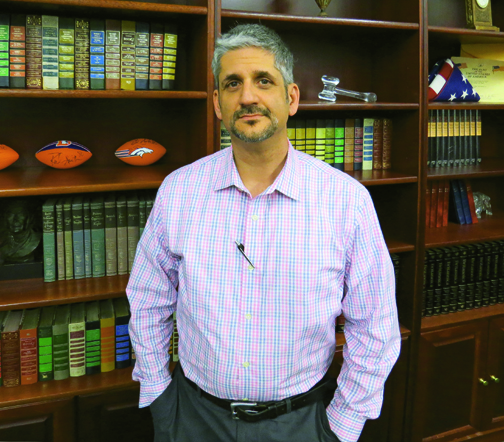
by Mark Smiley | Jan 30, 2017 | General Featured
 by Mark Smiley
by Mark Smiley
Step 13 has hired only its third Executive Director in 30 years, Paul Scudo. Scudo who had served as Director of Programs the last two years was hired after the search committee narrowed down the field of candidates to 12. He officially began his role in October 2016, but he was serving on an interim basis since last June. Peter Droege who was the Executive Director left the organization in May 2016.
For more than 30 years Step 13 has helped men overcome addiction and become contributing members of society through a “tough love” residential program that requires sobriety, work, and accountability. There is a zero-tolerance policy for drinking or drug use, and work is required from day one in the program.
The organization was founded by Bob Coté and his legacy lives on at the organization. Scudo not only acknowledges this, he embraces it. “We are privileged that for years Bob broke his back and did whatever it took to keep the doors open, help men out, and get the name Step 13 out in the community, and generate a donor base,” said Scudo.
Scudo was born in Philadelphia, and lived there until he was 16 when his parents moved to Charlotte, N.C. After graduating high school, he went to Michigan State University and got a degree in Hospitality Business. It is here where he met his two best friends who eventually saved his life and put him on the path to recovery. He moved to Denver and worked for the Hyatt Hotels Corporation and then the Hilton Worldwide Holding as Regional Director of Sales and Marketing.
It is in this position where Scudo made a comfortable living. He had an attractive home in Park Hill, with a loving wife, and for those who knew him, a pretty good life. But, Scudo kept a dark secret. He had become addicted to cocaine and alcohol and his addiction took a turn for the worse starting in 1998.
Five years later, in 2003, he was arrested for possession of narcotics and put into drug court. Even with the possibility of having a felony on record and going to jail, Scudo could not stop using drugs.
He continued to test positive on court ordered probation tests. The court would put him in jail for two days once a month for four years. Because Scudo showed up in a business suit and made seemingly valid excuses, they would continue to give him opportunities.
Finally, those opportunities would run out as his excuses were no longer accepted. In 2007, the court finally revoked deferred judgment, charged Scudo with a felony, and sent him to jail for six months. His 18-month probation that stretched to four years now converted into jail time.
After losing his job and serving his sentence, his first phone call after being released from jail was to his drug dealer. With no job and no income, but with a large amount of money in savings, a 401K, an IRA, Scudo became a hermit in his Park Hill home. He burned through $200,000 in 18 months, stopped paying the mortgage and all other bills, aside from the phone bill, so he could contact his dealer.
After the mortgage company and police officers came to his door and warned him to pay his mortgage or be evicted in 30 days, Scudo turned to doing more drugs.
After 30 days had expired, police officers came into his home and told him he had 10 minutes to gather what he could.
“I never, in my mind, believed I was going to lose everything,” said Scudo. Every other possession he had accumulated in his 40 years on the planet was thrown in a dumpster.
All of a sudden, Scudo was homeless. Over the next two years, he would hide in alleys and wooded areas. He would only go to populated areas to steal food from a grocery store or to get change to get a bottle of alcohol so that he could drink and numb the pain.
After being on the streets for two years, Scudo describes what was a spiritual intervention. He was in an alley and his two best friends from his days at Michigan State University came down the alley and said, “We finally found you, are you ready for help?” Scudo looked up at them and said yes but he couldn’t afford it. They told him they had it taken care of.
They put him into a drug addiction treatment center called CeDAR. CeDAR is integrated into the University of Colorado Hospital and is an expensive treatment facility. Scudo remained at CeDAR for three months.
He then moved to the Oxford House, a sober living home. He remained at the Ox-
Continued on page 15
Continued from page 5
ford House for a year and found it difficult to find work. A friend from his alcohol recovery fellowship group who owned a handyman business hired him to be his assistant. He worked for him for a year and started to volunteer at CeDAR.
His volunteer work would eventually lead to a full-time position as Recovery Care Manager at CeDAR after more education. He worked at CeDAR for three years and during this time was asked by the Anschutz Foundation (who funds both CeDAR and Step 13) to speak to the men of Step 13. Scudo volunteered for six months at Step 13 until one day Droege and then Board Chair Wendy Bergen pulled Scudo aside to ask if he would be willing to build a recovery program.
After volunteering to launch this program, it became clear it was going to take more of a full-time effort. Scudo was then hired in 2014 to be the Director of Programs for Step 13. “There was something in my heart telling me to do this,” Scudo said.
“I have a picture of Bob [whom he never had the chance to meet] on the wall in my office and I look at it every day to remind me I am lucky that he did all the really hard groundwork to get this organization where it is, and staying true to three key principles: sobriety, work, and accountability,” said Scudo. “While there’s been some change, the core philosophies remain the same. We are going to remain true to Bob’s original principles and we still believe accountability, self-sufficiency, partnered with work and individual recovery is how an individual restores their dignity and self-worth. We are going to help as many men as we can.”
Matthew Saks, chair of the board of Step 13 commented, “Paul Scudo is the ideal leader to take Step 13 into the future. He brings to this work so many important qualities: a deep sense of personal integrity, an understanding of nonprofit organizations and, most importantly, a profound passion for helping men in their struggle with addiction. In his work as program director, he has already transformed our recovery program into a national model for success. Having him in place as Executive Director ensures our organization’s sustainability and impact for many years to come.”
Scudo now lives with his new wife of four years, Cynthia, who has eight grown children and 20 grandchildren. Scudo, now 50 years of age, is appreciative for all of the gifts in his life. “I’ve changed the way I live my life,” said Scudo. “[It’s] about being of service and caring for other human beings. [It’s] how I interact with the average person I come in contact with.”
Scudo has a vision of where to take Step 13. He wants to open sober living homes and give men that are living at Step 13 that next step. He would also like to open up more Step 13 facilities across the state to help men in need.
“I’m humbled and I’m grateful for the opportunity to lead Step 13 into the future and in doing such, I’m going to stay true to Bob’s principles.”
Scudo is active in an alcohol recovery fellowship as a world delegate. He also enjoys camping, hiking, golfing, reading, bike riding, and movies. For more information on Step 13, visit www.step13.org.

by Mark Smiley | Jan 30, 2017 | Travel
by Megan Carthel
The Glendale Sports Center has a new director. Monica Henrichs started the position in mid-November, something she has been working toward.
“I want to say I’ve been preparing for this for a while because mentally I always knew this is where I wanted to be,” Henrichs said.
Henrichs is from Wisconsin and went to the University of Wisconsin where she studied Kinesiology and met her husband, Eric. The couple moved to Denver after being married for three weeks. Prior to the move to Denver, Henrichs was a trainer,  fitness instructor and health coach at a gym in Wisconsin, where she was working toward the director position.
fitness instructor and health coach at a gym in Wisconsin, where she was working toward the director position.
“I’ve always felt like I wanted to be in a director role where I can still talk to people and work with people but have more of a say in how programs run and be a little more creative on that side,” Henrichs said.
Henrichs isn’t afraid to get creative when it comes to running the Glendale Sports Center. In the works for 2017 is a variety of classes and challenges to form more of a community within the gym.
“I’d like to introduce some new formats of classes, offering a lot more variety I think is huge for our members because then they stay a little more excited,” Henrichs said. “My big, big goal for 2017 is to create a community between the fitness center and group fitness.”
Henrichs said she is compiling a list of new classes the current instructors would like to teach and that the classes should be available around April. Henrichs has more up her sleeve than just new classes
“We’re going to do a lot of fun challenges coming up that are fitness center based but also include group fitness and so people who are just fitness center people are getting a little bit of group fitness and vice-versa. That makes it more interesting I think,” Henrichs said.
In March, Henrichs and the Sports Center are planning a “fitness Bingo” challenge that is designed to incorporate both fitness center and group fitness aspects. The cur rent 2017 class schedule has one minor adjustment added to it. Henrichs is teaching a bootcamp class on Thursday evenings. The class is a head-to-toe workout based on strength and includes cardio and speed drills. Each week is a little different, but Henrichs can guarantee one thing.
rent 2017 class schedule has one minor adjustment added to it. Henrichs is teaching a bootcamp class on Thursday evenings. The class is a head-to-toe workout based on strength and includes cardio and speed drills. Each week is a little different, but Henrichs can guarantee one thing.
“Lots of fun sweating time,” Henrichs said.
Outside of the gym, Henrichs likes to watch sports and is an avid Green Bay Packers fan, owning a fair share of team emblazoned coffee mugs and a cheese head. She said she is excited for rugby to start up, a sport she has watched since she was a kid.
Henrichs and her husband have embraced the Colorado lifestyle, already hiking a fourteener and enjoying breweries around town.

by Mark Smiley | Jan 30, 2017 | Editorials

A couple of well accepted axioms are that bureaucracies endlessly seek to grow and expand and that some of the least ethical of humans naturally gravitate to ethical boards and commissions if for no other reason than to help obscure their own highly unethical conduct in life. Both appeared to be at work in the most recent attempt of the Independent Ethics Commission (IEC) to control home rule cities and others throughout Colorado under Amendment 41 by attacking former Glendale City Councilman Jeff Allen on behalf of owners of Authentic Persian & Oriental Rugs store.
Amendment 41 was the brainchild of Jared Polis before he became a congressman and it was a ballot initiative to the State Constitution imposing draconian limits on gifts by lobbyists and others to elected officials and to restrict certain lobbying for two years. By its express terms it did not apply to home rule cities in Colorado such as Denver, Aurora, Colorado Springs and 67 other cities since the Amendment stated it “shall not apply to home rule counties or home rule municipalities that have adopted charters, ordinances or resolutions that address the matters that are covered by this article.”
That is how the IEC has apparently ruled ever since its inception in 2006. But that all changed just before Christmas when the five-member board unanimously claimed jurisdiction over every city in the state.
The new IEC position was almost unanimously condemned by all g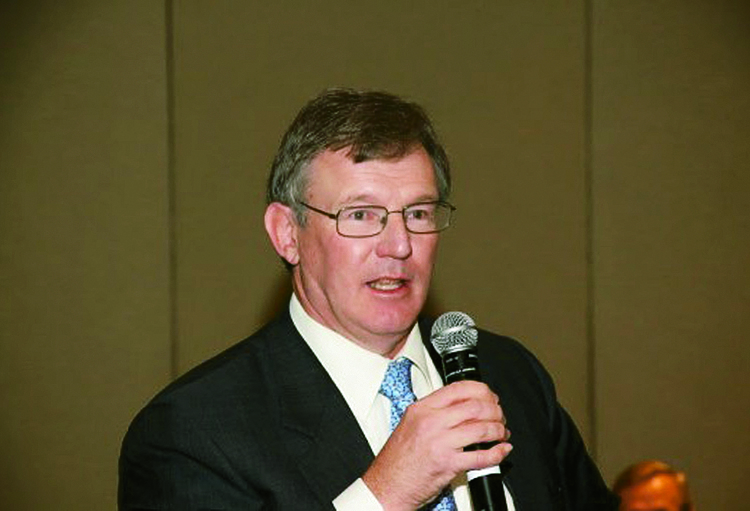 ood government groups in Colorado and even by strong Amendment 41 supporters such as Ethics Watch and Colorado Common Cause.
ood government groups in Colorado and even by strong Amendment 41 supporters such as Ethics Watch and Colorado Common Cause.
This is certainly not the first public condemnation of the IEC while under the control of its Chairman William Leone, an attorney, who has been controversial and is considered in some quarters to be highly disreputable. In early 2016 the State Auditor did an audit of the IEC and as stated by the headline in The Colorado Independent, “Audit: Colorado’s Ethics Commission has questionable ethics.” The State Auditor castigated Leone’s IEC saying it engaged in incredible sloppy record keeping and openly violated the state’s open meetings and open records laws. The Auditor could not even determine “whether the IEC consistently followed it rules over time, or properly conducted hearings . . . .” Former Secretary of State Scott Gessler has simply called the IEC — “Corrupt.”
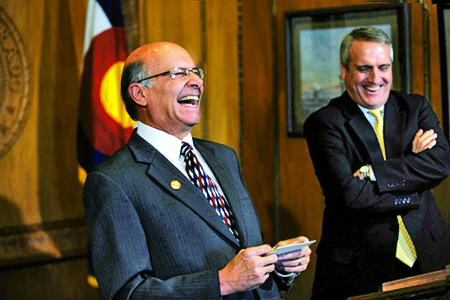
As a result of the audit the Colorado Legislature was aghast at the conduct of IEC and Leone who was a former Acting U.S. Attorney for Colorado, albeit intimately involved in the Alberto Gonzales scandal at the United States Department of Justice in 2006.
When Pat Steadman, State Senator for District 31 (which includes Denver and Glendale), sought to address the ethical lapses of Leone and the IEC including its use of the Attorney General lawyers and not its own, Leone went ballistic. He declared the bill was a “backroom deal” made by an unnamed former commissioner and Ethics Watch and Common Cause. He threatened to sue the legislature and “fight to the death in court,” if necessary. Steadman was incredulous at Leone’s assertion that not even the legislature had the right to pass bills that would in any manner affect the IEC. As one observer noted, “Bill Leone believes he is above the law and the ethics rules apply to everyone but him.” The bill ultimately failed and Leone’s megalomania went unchecked.
But few people knew exactly how out of control Bill Leone was until mid-January. Under Amendment 41 all complaints to it must be kept confidential until it is determined that the IEC has jurisdiction and the complaint is determined to be “non-frivolous.” The IEC illegally leaked to The Denver Post that it had determined that a complaint against Jeff Allen filed by the owners of the Authentic Persian & Oriental Rug store by Russell Kemp of Ireland Stapleton was “non-frivolous.”
The claim proffered was that Allen should not have voted on a unanimously approved city budget because the City, under a law adopted years ago, gives money to the Greater Glendale Chamber of Commerce and Jeff Allen as COO of the Chamber draws a small salary. Under such ludicrous logic no councilman could ever approve any annual budget because under that budget they draw a salary approved years before.
But the key to the decision is what in the world does such a complaint have to do with the IEC under Amendment 41 and its gift/lobbying limitations? Aha! It doesn’t. Amendment 41 has a vague little noticed provision that declares that the IEC has jurisdiction over not only gifts and revolving door lobbying but also “any other standard of conduct or reporting requirement in state law.” Thus under Bill Leone the IEC could go after doctors, lawyers, contractors, or virtually anyone else in the state. Its purported jurisdiction is virtually unlimited according to William Leone.
Moreover, individuals covering IEC meetings and hearings have reported possible skullduggery concerning the Allen case. Last year another ethically dubious establishment character Bernie Buescher (once an appointed Secretary of State but later soundly rejected by voters) was discovered hanging around various meetings although he had no public case or controversy before the IEC. He was engaged in what appeared to be illegal ex parte communications with Leone and Leone’s Executive Director Dino Ioannides. When caught in the act he disclosed that he was representing “rug merchants” in Glendale to get their high-rise built and was hoping to use the IEC to pressure the City Council. Upon review it was discovered that Buescher is “of counsel” to the law firm of Ireland Stapleton which of course represents M.A.K. Investments.
In various IEC minutes Ioannides declared that he has a “conflict of interest” regarding a certain mysterious case which observers believe concerned Jeff Allen. Typical of the lack of ethics of the IEC, Ioannides did not disclose (as required by state law) what was in fact the “conflict of interest.” Did it involve Bernie Buescher and the wealthy rug merchants of Glendale?
Which brings us back to Jeff Allen. He is but a pawn in a massive power game of William Leone. Allen left the City Council years ago and gets only a small salary as a Chamber COO. He has no funds to fight the sick megalomaniac dreams of ethically challenged Bill Leone and his IEC. It will of course bankrupt him.
That is, of course, why Leone picked Allen. If he challenged Mayor Michael Hancock over his 2015 Super Bowl Trip he could expect a major fight on his hands. Leone and the IEC can roll over the corpse of Jeff Allen many times over. He has no ability to fight a cadre of sleazy, unscrupulous lawyers like Bill Leone, Russell Kemp and Bernie Buescher.
It can only be hoped that Glendale and home rule cities throughout Colorado will rise up to take on Bill Leone and his highly unethical Independent Ethics Commission on behalf of Allen. If Allen goes down, he will be only the first of many potential victims of one morally repugnant individual — William Leone.
— Editorial Board

by Mark Smiley | Dec 22, 2016 | General Featured
$500,000 In Renovations But The Name, Sign, Bar And Booths Stay

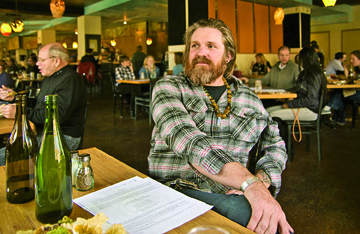 Home to an eatery since 1946, the corner of Exposition and University first opened as the Bel-Air and switched names to the Campus Lounge in 1949. Former Denver University and NHL hockey player Jim Wiste bought the business and real estate in 1976. The restaurant is expected to reopen as early as this month under new ownership.
Home to an eatery since 1946, the corner of Exposition and University first opened as the Bel-Air and switched names to the Campus Lounge in 1949. Former Denver University and NHL hockey player Jim Wiste bought the business and real estate in 1976. The restaurant is expected to reopen as early as this month under new ownership.
The sale of the Bonnie Brae landmark restaurant was announced to much fanfare with the last day of operation under the old ownership on September 25, but everything since that event has been shrouded in mystery, including who actually bought the business.
It was initially announced that a partnership led by St. Charles Town Company headed up by its president Charlie Woolley had acquired the Campus Lounge property along with fiction writer and vegan restaurateur Dan Landes. But a check of the real estate records by the Colorado Real Estate Journal showed that the property was, in fact, acquired by Exposition Avenue Properties LLC for $1.9 million with that entity headed by Wayne E. Barrett. Barrett is a vice president of ProLogic now headquartered in San Francisco but based in Denver until 2011.
“Wayne is an industrial real estate rock star,” Woolley told the Real Estate Journal. Barrett had hoped to remain anonymous in the Campus Lounge deal, Woolley explained. Furthermore, we’re told that Barrett is Woolley’s partner in another iconic restaurant, Wazee Lounge & Supper Club. Woolley bought the Wazee in 1997 but previously hadn’t disclosed Barrett was his partner. Since 1974 the Wazee Supper Club has been a landmark restaurant in Denver’s historic Lower Downtown district. Located at the intersection of 15th and Wazee Streets, it was founded by Angelo and Jim Karagas of My Brothers Bar fame.
In the case of Bonnie Brae’s Campus Lounge, Barrett had already put the deal together when he called Woolley to participate in it. “He really likes these cool, iconic places,” Woolley told the Colorado Real Estate Journal of Barrett. “He has a real passion for them.”
But they needed someone to actually run the restaurant. Woolley was then introduced to Landes by Todd Colletti, owner of the Buckhorn Exchange. The storied steakhouse — Denver’s oldest restaurant — is where mounted game gaze on dishes of yak, ostrich, elk and Rocky Mountain oysters.
The More Things Change — The More They Remain the Same
Opening under the same name — possibly as early as this month — the Campus Lounge is keeping the horseshoe bar, the booths plus the Campus Lounge sign. To continue the legacy of the Bonnie Brae eatery, the new owner is spending approximately $500,000 on renovation.
Woolley says the eatery will pay homage to the car efree ambiance Jim Wiste created for the generation of families, patrons, and friends who frequented his beloved lounge.
efree ambiance Jim Wiste created for the generation of families, patrons, and friends who frequented his beloved lounge.
Landes’ vegan restaurant City O’ City is doing well in Capitol Hill, and Landes reportedly wasn’t looking for another restaurant but the Campus Lounge seemed too good to overlook. “It’s got all of the elements — the right neighborhood and a big kitchen — to get a return on investment,” he believes.
Meet Campus Suspect
Landes’ reputation as a Denver touchstone began as a restaurateur when he founded WaterCourse Foods in 1998 and City, O’ City in 2006. His other lifelong passion is for literature that is always brewing just beneath the surface. In 2012 he released his debut novel, Joonie and the Great Harbinger Stampede, a creation myth about the birth of consciousness, told through the lives of prairie animals. He sta rted his own publishing company, Suspect Press, in 2013 along with Brian Polk and Ken Arkind, and has published several of his own works since then.
rted his own publishing company, Suspect Press, in 2013 along with Brian Polk and Ken Arkind, and has published several of his own works since then.
The old Campus Lounge was famous for its burritos, burgers and beer. What the new menu will be is not yet revealed, but you can expect a full review of the revived restaurant in the next issue of the Glendale Cherry Creek Chronicle.
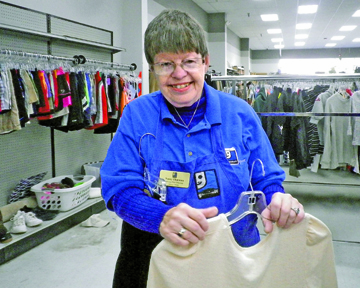
by Mark Smiley | Dec 22, 2016 | Travel
by Ruthy Wexler
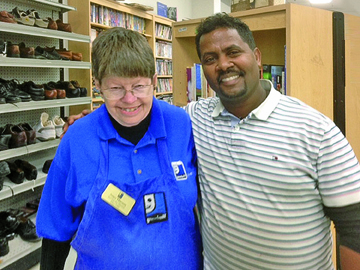 In a corner of the Goodwill Thrift Store in Glendale, employee Nancy Thurman plucks a pink sweatshirt from a shopping cart piled with clothing. First she tests the zipper. Then she bends to scrutinize the material. “I am looking to see if there’s a big tear,” she explains. “Or if it has a button missing. Or if it’s dirty.”
In a corner of the Goodwill Thrift Store in Glendale, employee Nancy Thurman plucks a pink sweatshirt from a shopping cart piled with clothing. First she tests the zipper. Then she bends to scrutinize the material. “I am looking to see if there’s a big tear,” she explains. “Or if it has a button missing. Or if it’s dirty.”
The shirt passes muster. “I’m zipping it up so it won’t fall off the hanger,” Nancy states, brown eyes proud of knowledge gained from experience. Then she goes to get another item from the overflowing cart.
Nancy is 70-years-old. This past July, she celebrated her 50th anniversary with Goodwill. You might jump to the conclusion that she never again wants to see one more pink sweatshirt. But from all accounts, working at Goodwill is the happy center of Nancy’s life.
The youngest of three sisters, Nancy was born in an era when families did not talk about having a “special child.” Nancy’s oldest sibling Lynne reflects on Nancy’s luck at being born to their particular parents. “My mother’s philosophy was: ‘We created a beautiful little bird and we will let it fly.’”
There was no mainstreaming back then; her parents enrolled Nancy in the Developmental classes at Wyman Elementary and East High School. “Growing up,” Lynne recalls, “we got involved with people in Nancy’s various classes. We saw how they were not allowed to be open to possibilities. My parents could have kept her in a safe little bubble. But instead they said, ‘Let her live.’”
Nancy began with love and acceptance. Still, research has shown that happiness comes from finding purpose in life. “Happiness cannot be pursued; it must ensue,” goes the famous quote from Victor Frankl. So in Nancy’s senior year, when she interned for Goodwill, then got a job there upon graduation — it seemed an extremely lucky break.
Except … for Goodwill, this was business as usual.
“It is our mission, it’s what we do, help people who face what we call ‘barriers to employment’,” says Vanessa Clark, Senior Director of Marketing at Goodwill Industries of Denver. “We have lots of folks just like Nancy. In lots of ways, her story is not unique.”
Goodwill Industries of Denver separates people who encounter “barriers to employment” into three groups — at risk students, struggling adults and families, individuals with disabilities — and provides programs to serve them. “All the programs are work force development in nature,” Clark explains. “It is all about helping people take care of themselves.”
Goodwill provides a variety of services for both intellectual and developmental disabilities; e.g., workshops in American Sign Language, training individuals to fix donated bicycles and electronics, facility based day programs.
So the clothing and coffee pots we see are just a tip of the iceberg?
“Yes,” smiles Clark. “This is our funding model: get donations, sell those donations through retail stores, and through the proceeds, fund our programs. All that clothing is processed by donation attendants, who are simultaneously learning organizational and other life skills.”
When Teshe Shimeles worked as a donation attendant, the life skill he learned was fluent English. As an ambitious 26-year-old in Ethiopia, Teshe won his DV (Diversity Visa) through a lottery; upon arriving in Denver in 2001, he was guided by his sponsor to Goodwill. Fourteen years later, he is manager (and has been for over a decade) of the Glendale Goodwill, supervising 44 employees, including Nancy Thurman.
“Seriously … Nancy is the best worker,” Teshe says. “Never late. Never forgets anything. We call her the Governor of Shoes.”
The story goes that, a few years back, when Nancy’s job was organizing the store’s shoes, she confounded everyone by finding a mate for every single shoe. “At the end of the day,” Teshe recalls, “she knew exactly how many white pairs,  how many brown …”
how many brown …”
As a child, Nancy was presented with a confusing array of cognitive limitations and physical difficulties. For a while, the family thought her diagnosis might be Savant (think Rain Man with Dustin Hoffman). “She’s always the scorekeeper when we play Yahtzee,” Lynne says, laughing. “My sister and I are college graduates but even before we begin adding up the numbers, Nancy’s done. And she’s always right.”
Despite her arithmetic facility, Nancy needs her family’s help to live independently. She sees them often, plays hide and seek with the little ones at family gatherings. “Everyone loves Aunt Nancy,” Lynn says. “She’s a character.”
But she’s something else, too: an important person at work. Co-workers appreciate Nancy’s willingness to help out wherever needed. They kid her affectionately about her love for the Broncos. When she was younger, Nancy was part of a circle of friends from Goodwill who went out together. “But those people were older and they’ve died,” Lynne relates. “Now, she feels so good about coming into work. She feels she has friends here.”
Does she ever get tired of working?
“No, I don’t get tired. Am I not the Governor of Shoes?” Nancy answers. She says proudly, “Teshe tells me, ‘I don’t know what we’ll do when you’re gone.’”
“Goodwill has given Nancy a sense of purpose,” Lynne observes. Then more quietly, “She has been molded by my parents … and by Goodwill.”

by Mark Smiley | Dec 22, 2016 | Editorials
The 18 month long legal ordeal brought by M.A.K. Investments, LLC controlled by Mohammad Ali Kheirkhahi and his in-laws Saeed Kholghy and Nasrin Kholghy against the City of Glendale is finally over as chronicled on the front page of this newspaper. As in the case of many protracted wars it ended not with a bang, but with a whimper as M.A.K.’s lawyers have gotten the state court to dismiss with prejudice the last of its outrageous claims without even a single minor concession by the triumphant attorneys for the City of Glendale.
When President Ronald Reagan’s Secretary of Labor Ray Donovan was acquitted of all charges brought against him and six other defendants by a Bronx jury in 1987, he famously asked outside the courthouse, “Which office do I go to to get my reputation back?” The City of Glendale must wonder the same thing.
Glendale has spent close to a fifth of a century building an extraordinary city so that it could be known for more than simply the home of Shotgun Willie’s. The city acquired various parcels of land at no small cost for a series of extraordinary parks; it turned Cherry Creek Drive South from an eyesore into an amazing parkway with a wonderful circuitous pathway beside the creek; it built a first class boutique recreation center and made it available to its citizens at extremely low rates; it built a conference center that is one of the top venues in all of metropolitan Denver; it created Infinity Park a world class rugby venue such that internationally the city is known as Rugbytown USA; it made the city business-friendly and it attracted major investments such as CitySet greatly broadening the city’s tax base, etc., etc., etc.
The culmination of its efforts was to create a real downtown eating and entertainment district along East Virginia Avenue originally known as the Riverwalk and later the Glendale 180 Project. M.A.K acquired its 3.8 acres of land along E. Virginia to take advantage of the investment the city was going to make in the area but then decided it could make more money by building a massive apartment complex on its land to take advantage of the apartment boom in metropolitan Denver. M.A.K. did not care that the city height restrictions, the City Master Plan and zoning laws did not permit the same or that its massive apartment building would effectively destroy the Glendale 180 Project. M.A.K. and its principals only cared about what would make the most money for them and them alone.
In its greed and avarice M.A.K. decided it must threaten to, and then try to, destroy the reputation of the city and its elected officials and employees. It went after, to name just a few, Mayor Mike Dunafon, former Councilman Jeff Allen, Deputy City Manager Chuck Line and City Clerk Sherry Frame as outlined in the front page story.
Neither M.A.K. nor Mohammad Ali Kheirkhahi and his in-laws apparently appreciated the toughness of a community that as an unincorporated town and then a home rule city has had to fight to prevail overwhelming powerful forces for its mere existence since 1859. Mayor Mike Dunafon adopted as his creed regarding the matter a variation of the statement in John F. Kennedy’s inaugural address, to the effect: “Let everyone know, whether it wishes us well or ill, that we shall pay any price, bear any burden, meet any hardship, support any friend, oppose any foe, in order to assure the survival and the success of Glendale.” It is a sentiment that every leader of Glendale over the last 150 plus years could appreciate and support.
According to City Attorney Jeff Springer, Glendale will consider seeking from the courts reimbursement for its massive attorneys’ fees and costs involved in the M.A.K. litigation. Glendale might want to also consider bringing abuse of process claims against M.A.K., Mohammad Ali Kheirkhahi, Saeed Kholghy and Nasrin Kholghy to recover the loss associated with the harm done to the Glendale 180 project. In its war against the City of Glendale and its people, M.A.K. has laid many land mines and poisoned its share of wells, not all of which have been uncovered. Discovery in such a lawsuit would help expose those many hazards that are lying in wait for the unwary in the city. Glendale has been and must ever be vigilant if it and its people are to prosper.
— Editorial Board
















